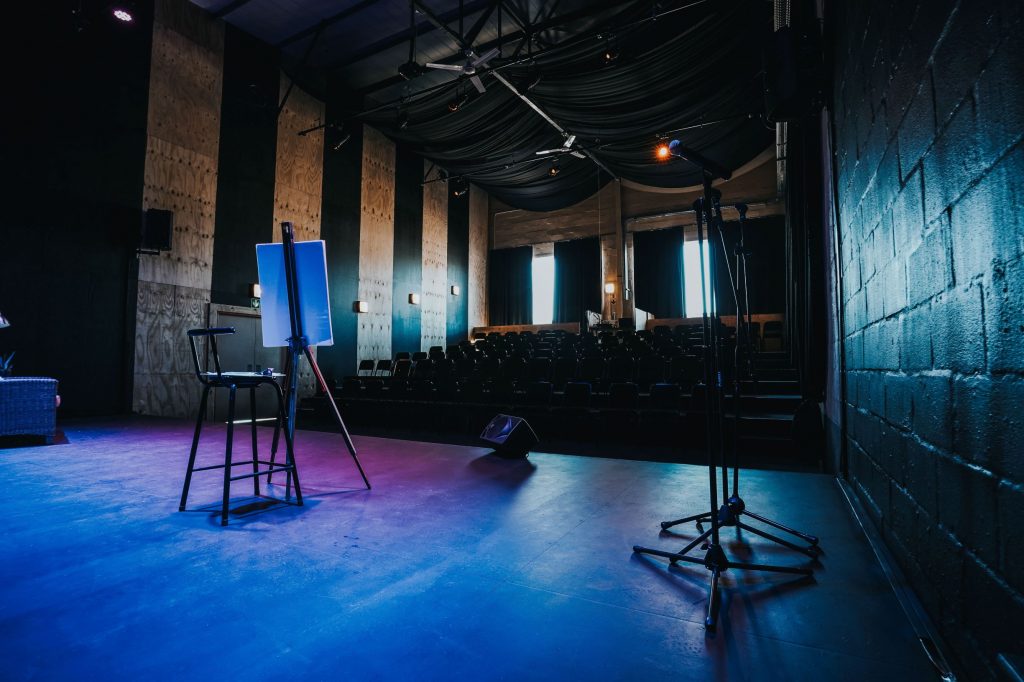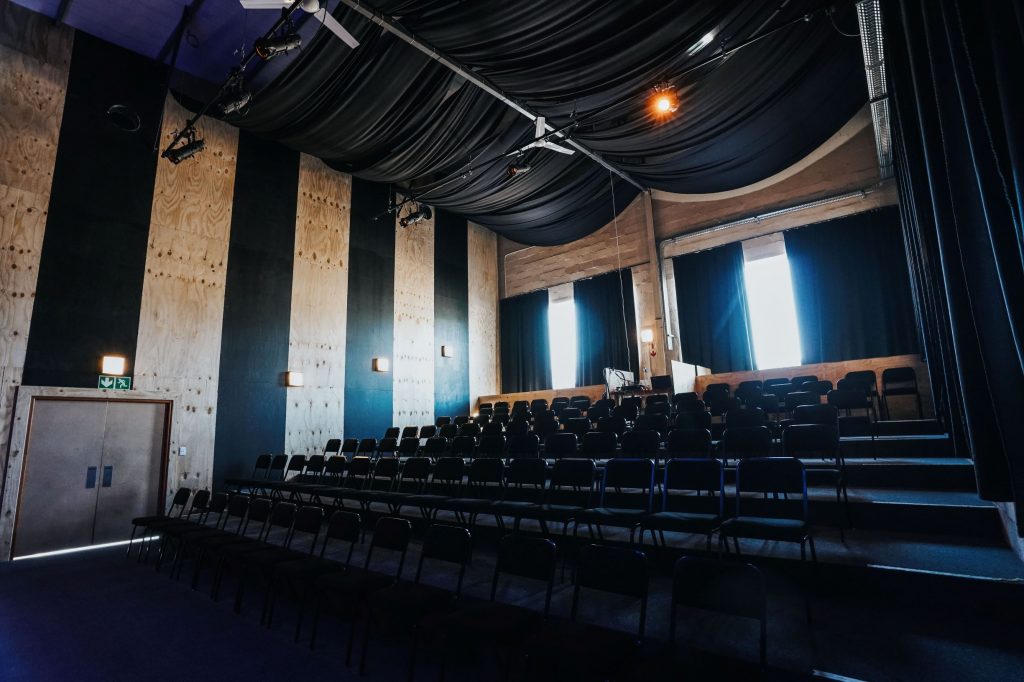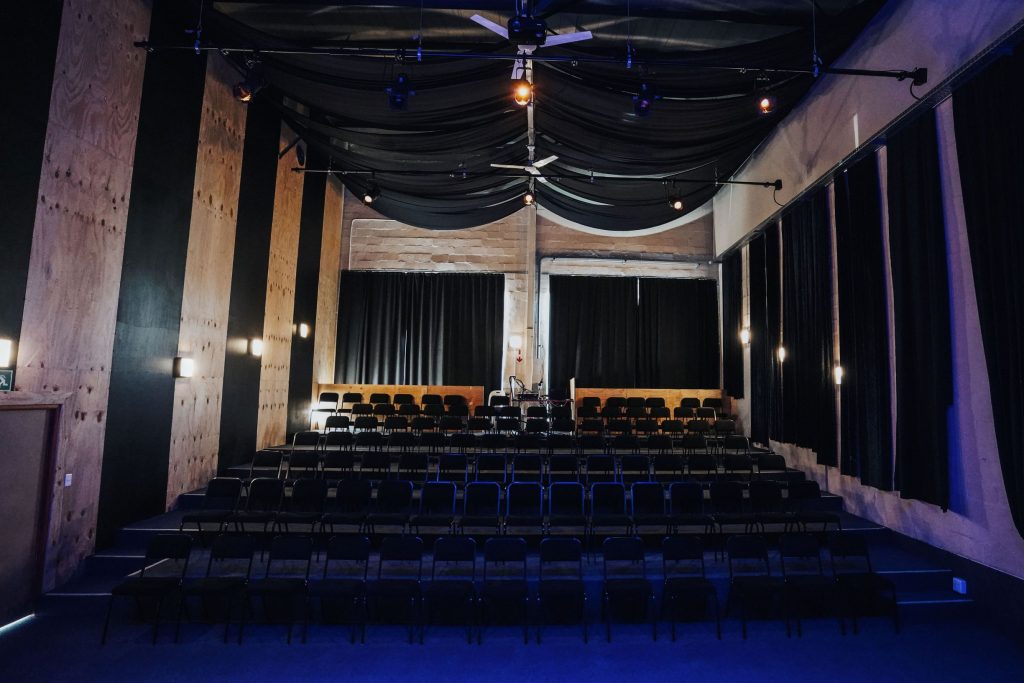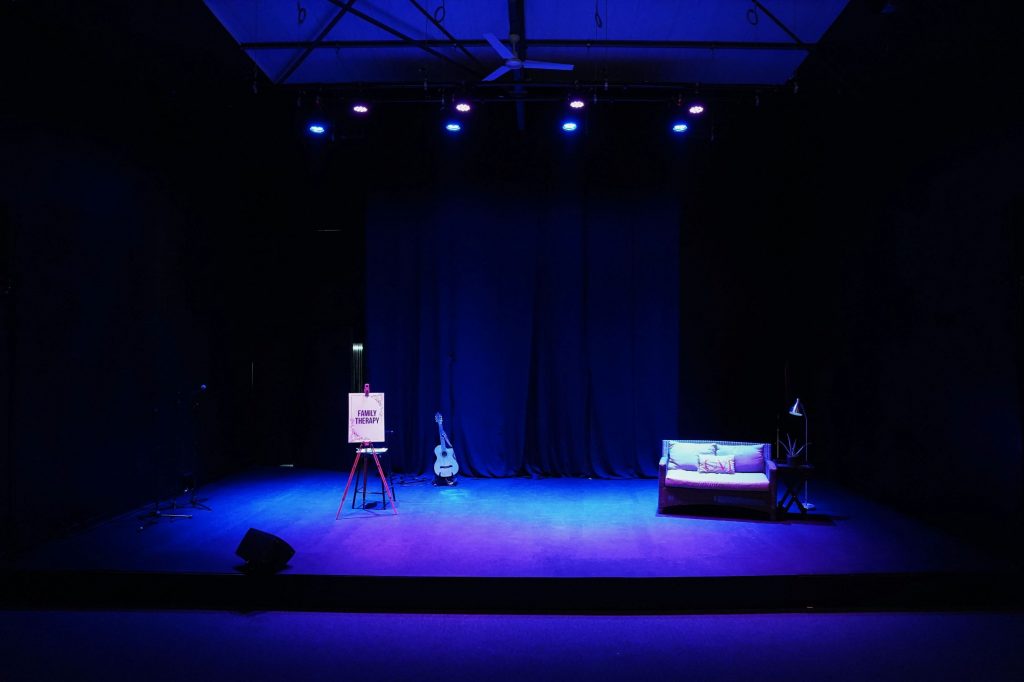Somerset West, a small town some 50km east of Cape Town, is home to a privately run theatre space called The Drama Factory. The brainchild and passion project of Sue Simpson Diepeveen, The Drama Factory offers audiences in the area the opportunity to see a range of works, from fun-filled musical tribute, shows to some of the most beautifully crafted theatre productions that South Africa has to offer. In a recent interview, following the reopening of The Drama Factory in February of this year, Sue shared her incredible journey as an actor, mother, teacher and business owner.
“I started my career as an actress when I left school and took a two-year-long trip to London, where I was very blessed to be able to study my craft in one of the most wonderful cities in the world for theatre,” says Sue. “While I will forever cherish the amazing opportunity that my family afforded me during this time, I always wanted to come home and raise my family in South Africa,” she says.
On her return in 1990, Sue completed her teaching diploma under the supervision of Rita Maas-Phillips, founder of The Cape Academy of Dramatic Art, and started teaching at the academy after qualifying. “Teaching is something that I really enjoy but, during my first pregnancy, the travelling between Somerset West and Cape Town became more of an issue, and I decided to start a small drama studio in the area.”
According to Sue, there were only a handful of private schools in Somerset West that offered drama programmes as a part of the curriculum, and there were very few creative extramural on offer for children in the area at the time. “Traditional school culture tends to place a lot of emphasis on children’s academic and sporting achievements, and the performing arts are often considered as an afterthought – despite the fact that numerous studies have found that participation in drama and the performing arts has enormous benefits for children’s emotional and social development, skills that are critical in the modern world of work.”
Having identified an area of need in the community, Sue was soon running a very busy private drama studio and brought onboard two additional full-time teachers to meet the demand. During this time, a fellow drama teacher, who ran the drama programme at a well-established school in the area, approached her for help. “I was not looking for a job, and didn’t actually have the time, as I also had three young children at home, but the teacher in question had been diagnosed with an illness that would make it impossible for her to continue her work. Not wanting to disappoint her or the children in her care, I took on the role of drama teacher at Somerset House Preparatory and handed my studio over to one of the teachers, Chantal van den Hoven.”
Managing a demanding teaching portfolio and producing school plays from scratch in addition to raising a young family and being an active community member kept Sue very busy for a number of years. “As I approached my fortieth birthday, I took a critical look at my life and decided that I wanted to slow down a little and reassess my future path. I always had enormous respect for Bess Finney, a brilliantly talented South African actress whose classes I attended during my student years. Bess left her very successful career to raise a family, and then returned to the stage in her forties and enjoyed an enormously successful career as a stage actress in her later years. “This, together with some encouragement from my agent, I did the unthinkable, and decided to relaunch my acting career.”
Prior to this life-changing decision, Sue and her husband had purchased a unit in an industrial park in Somerset West and used the space for a range of business activities over the years. “We bought the warehouse about ten years ago and used the space in various ways, but never to its full potential. While I was still teaching, we started to use a portion of the warehouse as a teaching and rehearsal venue, as we were having difficulty securing other spaces.” Sue goes on to explain that they built a rudimentary stage with make-shift curtains, which they used for children’s workshops and rehearsals, but she never thought of it as an actual performance space.
“Grace Newton, a beautiful singer and performer and lead vocalist for The Old Town Band, a really wonderful bluegrass ensemble had grown up in the area and her friends and family were bugging her to put on a show for the local community. She approached me one day to ask if she could use the warehouse as a venue for the show and I saw no reason to refuse. With a few lampstands and hired-in chairs, Grace put on a wonderful show – and to my enormous surprise – people came and really enjoyed the space. On that fateful evening, The Drama Factory was born, and has grown quite organically in line with the needs of artist and audiences ever since,” she says.
When Sue first made the commitment to turn her warehouse into a performance venue, she had little to no knowledge about the technical requirements of a professional theatre. “When I first started rigging The Drama Factory as a commercial performance space, I had absolutely no idea about what I was getting myself into from a technical point of view, and I made a lot of mistakes along the way. While I did get a lot of advice, some of what I was told was not applicable to a theatre environment and a lot of good advice simply went over my head,” she reflects.
Despite the seemingly insurmountable challenges, Sue persevered not only with her own acting career but also as a venue manager. “Not knowing any better, I decided to install the most rudimentary rig that I could afford and hoped for the best. To my astonishment, some of the very best in the industry embraced the space wholeheartedly, over the last three years, we have showcased work by some of South Africa’s leading actors and directors, including Chris Weare, Klara van Wyk, Mike van Graan, Kanya Viljoen, Rob van Vuuren, Margot Wood, Paul du Toit and Jemma Kahn to name a few,” she says.
“I strongly believe that to grow audiences in South Africa, we need to bring theatre to the people, rather than asking people to go to the theatre. There are some amazing theatres in Cape Town’s CBD, and I would never want to compare The Drama Factory with the likes of The Fugard or The Artscape, that would be ridiculous. However, there are a lot of people in the ever-expanding suburbs around the CBD who love the theatre but don’t want to travel with their families to the city at night.
“In addition, there are so many wonderful writers, directors and actors in South Africa that simply don’t have the opportunity to produce work as there are so few places to stage it. The big theatre houses tend to book pieces from well-established names in the industry that are certain to attract a paying audience. The risk with this approach is that young artists are left with no space to grow, which paints a bleak picture for future generations of theatre makers in the country,” she points out.
Over a three-year period, The Drama Factory has become known in Somerset West as a wonderful space to enjoy live theatre in a safe and welcoming environment. Children from the surrounding areas have had the opportunity visit a theatre for the first time in their lives, thanks to the generosity of community members who regularly sponsor local children from disadvantaged backgrounds through a “take a child to the theatre” initiative. Sue is also a passionate ambassador for young artists and relishes the opportunity to produce work for young theatre-makers looking for a break.
“Running a theatre is an enormous undertaking, and I have spent more sleepless night than you can imagine nurturing this space into existence. You can imagine my angst, therefore, when our neighbour let me know that he would be installing industrial equipment that would be running noisily all day and night in the building right next door.” Trusting to the ‘theatre angels’, Sue once again hoped for the best and soon discovered that a corner unit in the park was available and she received an offer of purchase on her existing unit.
“Knowing what I had gone through to get The Drama Factory up and running the first time around, I knew that this was an opportunity to make more informed decisions and do things properly,” Sue explains that she had done some work with Aaron Mcllroy and Lisa Bobbert, who had suggested that she contact Michael Taylor-Broderick and the DWR Distribution team to get the advice that she needed for the technical aspects of her venue.
“While all of this was happening, I was away in Grahamstown, performing Michael van Graan’s Two to Tango with Paul du Toit for the National Arts Festival,” Sue explains. “I was standing in the venue hours before curtain-up, at my wit’s end as I needed to hang two pictures and I had no idea how to get this done. Suddenly this guy, who I discovered was the aforementioned Michael, was six feet up a ladder rigging my pictures. I cannot tell you what it meant to me at that moment, and I will never forget the overwhelming sense of relief that I felt. I knew that my ‘theatre angels’ had once again provided!”
In the months that followed, Sue consulted at length with Michael and the DWR team about what she would need to rig her theatre. “For the first time in this whole process, I was dealing with a team of professionals that understood exactly what I needed to make the theatre work. Most refreshing for me was that Michael, Bradley Bruchhausen from DWR’s Cape Town office and theatre lighting expert, Kevin Stannett all understood the budget that I had to work with, and went to incredible lengths to find the gear that would provide a professional look and feel without bankrupting me!” Following extensive site visits, the DWR team put together a plan that would see the new venue being equipped with rigging points, fly bars, DMX controlled lighting, LED parcans and the underlying infrastructure needed to operate a professional theatre stage and auditorium.
She goes on to explain that when she reached a point where she simply could not make a decision about purchasing a DMX interface to control her lights, Michael stepped in and simply produced an eDMX1 PRO out of his bag, knowing how critical the piece of equipment would be to her lighting rig moving forward.
“Bradley had already started work on my lighting in the old venue and we had developed a good working relationship. When the DWR team started rigging the new space, they pulled out all the stops to make sure that I was ready for my opening night,” she says. “Brad has been there for me every step of the way and I cannot begin to express what it has meant for me, the artists that have come to love our stage and my loyal and valued audience.”
“The Drama Factory started as a warehouse that was used, on occasion, as a theatre. I now have a beautiful theatre that happens to be in a warehouse. My whole life is in this business now, and I have no option but to make it work. I would not have been able to continue on this incredible journey without beautiful people like the DWR team.”








